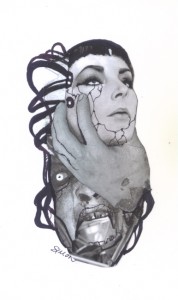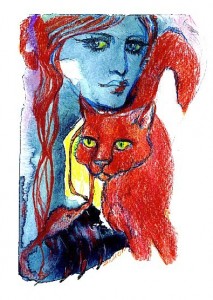February in Poetry: “Women in Horror” & Introduction by Peter Adam Salomon, Editor
‘Strangulation’ by Marge Simon

In the ‘November in Poetry’ column, poet Wendy Rathbone touched on an eternal truth that is so vital that I wanted to follow up on it. Wendy spoke of the ‘earliest and best known darker tales’ being poems:
“Beowulf,” “The Iliad,” “The Odyssey.” Dark poetry continues throughout known history from Dante’s “Inferno” to Milton’s “Paradise Lost” to William Blake to Poe.
This month, I’d like to go back even further in time, to show just how important the darkness has been, not just to poetry, but to all literature.
One of the oldest surviving works of literature is the Epic of Gilgamesh. It dates all the way back to the 18th Century BCE. For those unfamiliar with the story, here’s a really short recap:
Gilgamesh, King of Uruk, is friends with Enkidu, a wild man created by the gods as Gilgamesh’s peer to distract him from oppressing the people of Uruk. Together, they journey to the Cedar Mountain to defeat Humbaba, its monstrous guardian. Later they kill the Bull of Heaven, which the goddess Ishtar sends to punish Gilgamesh for spurning her advances. As a punishment for these actions, the gods sentence Enkidu to death.
Gilgamesh’s distress at Enkidu’s death causes him to undertake a long and perilous journey to discover the secret of eternal life. He eventually learns that “Life, which you look for, you will never find. For when the gods created man, they let death be his share, and life withheld in their own hands.”
Doesn’t really get much darker than that, no?
It has been four thousand some odd years since the time of Gilgamesh, but a vibrant, vicious thread of darkness has haunted poetry for every one of those years. And celebrating that thread is the purpose of the Horror Writers Association Poetry Page.
Modern horror poetry owes a tremendous debt to Gilgamesh’s friendship with Enkidu. As Gilgamesh faces the inescapable fact of his own death, he leaves a haunting legacy to literature. Death is the one constant, throughout history, across the world. In every language there are poems that deal with the end of life, with what lies beyond. And in the poetic search for poetic answers, every poet who has ever put pen to paper (or blood to papyrus or stick to cave wall or fingers to keyboard) has discovered different questions to ask about that darkness.
Whether it is the monster under the bed or the witches in the attic or the creature coming up behind you, the poetry of horror and the horror of poetry are intertwined. In dark poetry we seek the truth without blinders on, shining light into the darkest corners, ripping off the bandage as quickly as possible.
And in the scares, in the fear, in the chills and the bumps in the night there is the ancient knowledge that the darkest of poetry shines a light on the greatest truth.
“Hi, my name is Peter Adam Salomon, and I’m a poet.”
“Hi, Peter…”
Yes, it sometimes feels as though poets live such anonymous lives (and need 12-step recovery programs to retain some shred of sanity). The goal of my tenure as Poetry Editor of the HWA Poetry Page will be to alleviate some of that anonymity.
Whether you call your own poems Horror Poetry, or Dark Poetry, or something else, by any name, this page is here for you.
First, a little about myself.
While my publishing credits are in novels (specifically YA Horror. My first novel, HENRY FRANKS, published by Flux in 2012, was called ‘The thinking teen’s horror choice of the year’ by Booklist. My next novel, ALL THOSE BROKEN ANGELS, a ghost story, will be released in Fall 2014 by Flux. I have always thought of myself as a poet. Some of my oldest poems date back to when I was only seven years old and the majority of them have a definite affinity for the darkness.
Most recently, I served on the Poetry Jury for the 2013 Bram Stoker Award and my resolution for 2014 is to actually publish some poetry.
To give just a little taste of my own poetry, I’ve chosen one poem to share today.
The reason I picked this particular poem is because it’s representative of my voice, the rhythm and the vague sense of unease that whispers beneath the words. If you were to ask ‘what does this mean?’ I’d have no answer for you. It means nothing and everything and anything, as all poetry should mean. As all of life contains both the shadows and the light, dark poetry illuminates the darkness and casts wicked shadows across what precious light remains. Come explore the shadows with the HWA Poetry page and the poets of the Horror Writers Association.
☠
The Soul To Save…
by Peter Adam Salomon
the blood to taste
to drown the kiss
knife touch through the sigh
illusion caresses memory
and understanding is a lie
rape the tenderness
to touch the ritual
this realm of sanctity
religion tastes of human flesh
as the blood runs down
they pray
their souls to save
and yearn to touch the wicked…
the sane to cry
to sleep the dream
touch tears through the kiss
vision caresses sensuality
and comprehension is a crime
innuendo tastes imagination
violates the ritual
the prayer is vanity
the wish is just a need
religion tastes of human flesh
as the blood runs down
I pray
my soul to save
and die to kiss the wicked…
So, without further ado (and there’s been a lot of ‘ado’ so far), it is now February 2014. As you may (or may not) know, this is also Women in Horror Month. To celebrate, I’ve asked some spectacular HWA poets to share some of their love themed horror poetry with us (it is, after all, also the month with Valentine’s Day). I hope you enjoy! If you have any comments or suggestions or submissions for future months of the Poetry Page here at HWA, please email me at poetry@horror.org. Thanks for visiting!
☠
Love’s Ritual Goblet
by Terrie Leigh Relf (published in Letting Out The Demons and Other Poems, 2013)
When you first press love’s
ritual goblet to my lips,
it burns. . .
Long before I take the first drink,
I know this is madness. Even as
your eyes bore into mine,
your hands grip me tighter
within your arms while
you whisper, “Invoke chaos with me?
Say you accept.” I say, “Yes”, and am thrown off
a cliff where I take wing on your breath
just before reaching the ground.
You press the cup to my lips again,
and the poison seers through me
until submerged beneath glacial ice,
I can barely breathe.
Say you accept.” I don’t want any more,
can’t take anymore,
but you urge me to keep drinking
until I don’t know where I end
and you begin, where you begin
and I end. . .
Say you accept.”The vortex is spinning
and I remember something
you once said about the antidote
being the poison and so I take hold
of the goblet, drink deeper
until the dragon awakes within my belly
opens its eyes, uncoils.
Mother cannot help me now, Persephonae realized…
by Terrie Leigh Relf (published in Letting Out The Demons and Other Poems, 2013)
for she is gone a thousand years, and I am left to
fend for myself against these men
who would feed me fruit,
speak of love,
but lie,
lie,
lie.
☠
Pandora
by Marge Simon © 2011
She never looks back
on what she finds,
or what she kills,
never asks questions,
doesn’t care.
That was her mother’s undoing,
not hers.
Pandy plays games
of her own design,
her box (if you will) is
not what you think.
She’s all about leather,
the chains and the tether.
With velveteen gloves
she wields her whips
more than one at a time—
a cat o’ the nine,
she delights you,
excites you
teases to please,
kissing your arse
with a bit of class,
tonguing her whips,
she rips that sweet skin
from your bones,
all for a rapture
of her own.

Queen of the Purple Night
by Marge Simon © 2011 in The Mad Hattery
She comes when you are ready
to accept that which you wish,
the answer to your last dream,
the one that you ran from
all your days. She comes
in the moments before
waking, before you can
rub the dark away, or turn
off your alarm. She comes
soft robed in purple flames,
sweet as some familiar fantasy
you never could remember,
sings you back to forever sleep
in the arms of her dark hair.
‘The Feral’ by Marge Simon
☠
Heart of the Matter
by Linda Addison published in Consumed, Reduced to Beautiful Grey Ashes (2001)
I want to enter
your beautiful blue veins
dance in sweet plasma
tango with precious blood cells
rush eagerly to the citadel of life
and there
accept the sweet embrace
of your relentless love.
One Night Stand
by Linda D. Addison, published in Deadlines magazine (1994), reprinted Animated Objects (1997)
They met at a singles bar
and at first glance
she knew it was love
deep and true,
and at first touch
he knew it was love
slick and cool,
and at first kiss
they knew it was love
wet and hungry,
and at first bite
he knew
it was over.
☠



